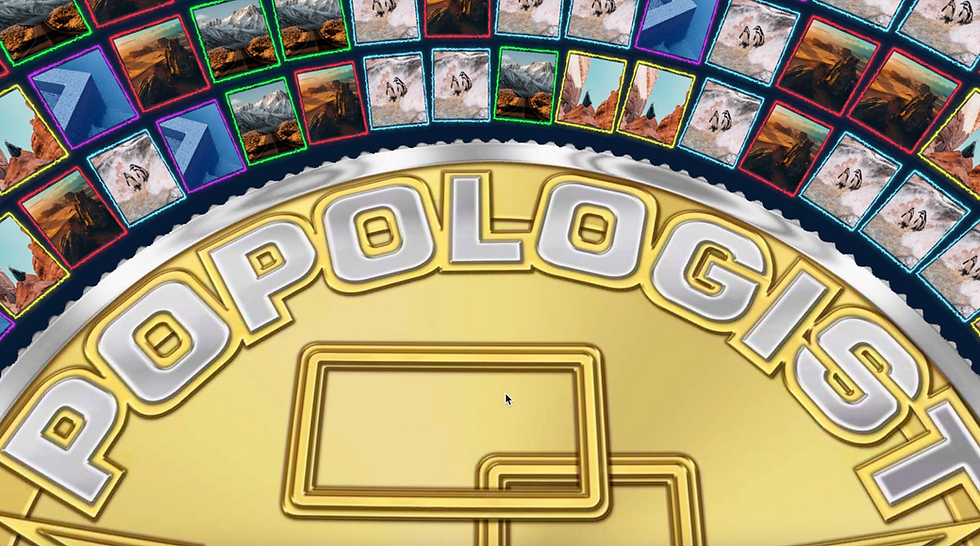Symphonies from the Soul: Beethoven’s Popological Impact
- TheGoochPopologist!

- May 19, 2025
- 9 min read
🎼 Beethoven: The Sonic Revolutionary Who Composed the Future of Music
When Ludwig van Beethoven was born in December 1770 in Bonn, Germany, the world didn’t yet know what a composer could be. Music was still in the elegant grip of the Classical era, shaped by order, structure, and the nobility’s polished taste. But Beethoven wasn’t born to conform

he was born to transform. And what he would leave behind wasn’t just a body of work—it was a revolution in sound, spirit, and soul that still ripples through every genre of modern music today.
🎹 The Fire Before the Flame: Beethoven’s Early Life
Beethoven's childhood was anything but idyllic. His father, a strict and often abusive music teacher, pushed him to be a prodigy in the mold of Mozart. He trained tirelessly at the piano under candlelight, his hands trembling as much from fear as from cold.

But the young Ludwig carried something deeper than talent—he had vision. By his teenage years, his improvisational skill at the keyboard was already turning heads, and he was sent to Vienna—the epicenter of European music—to study with the greats.
In Vienna, Beethoven studied under Joseph Haydn and began to develop his own fierce musical identity. He wasn't interested in simply following rules; he wanted to speak truth through sound. Early compositions like his first symphonies and piano sonatas hinted at something volcanic simmering under the surface.

🌩️ Breaking Through the Mold: Beethoven’s Rise to Power
As Beethoven matured, his music broke the constraints of the Classical world. He began injecting emotion, drama, and personal struggle into his compositions. His Third Symphony, the Eroica, was longer, bolder, and more unpredictable than anything that had come before it. It wasn’t just music—it was a declaration of individuality.

By the time he reached his middle period, Beethoven had composed iconic works like the Fifth Symphony, with its now-legendary four-note motif—da-da-da-DAAA—a knock at the door of destiny itself. He turned inward and wrote music that dared to explore what it meant to be human in an uncertain world. He wasn't just composing for kings and courts—he was speaking to the masses.

🔇 The Silence That Roared: Beethoven’s Deafness
Then came the twist no composer could prepare for: Beethoven began to lose his hearing.

By his early 30s, the symptoms were undeniable. By 40, he was almost completely deaf. For most people, this would have meant silence and surrender. But Beethoven didn’t just keep writing—he evolved.

His deafness forced him to compose from within, hearing every note in his mind. In this internal world, his imagination expanded beyond the limitations of sound as it was heard

he began to craft music as it was felt. The Ninth Symphony, his final complete symphony, was written in complete silence. And yet, it is one of the most triumphant, humanistic, and celebratory compositions in all of Western music, ending in the immortal “Ode to Joy.”
🕊️ Death and the Birth of a Legacy
Beethoven died in 1827 at the age of 56. Over 20,000 people attended his funeral in Vienna. He had become not just a composer, but a symbol—a mythic figure who defied fate and rewrote the laws of music and human expression.

But his death was not an end. It was a beginning.

🎸 Beethoven and the Blueprint of Modern Music
Beethoven’s influence didn’t end with symphonies or string quartets. His fearless emotionality, rhythmic power, and structural experimentation laid the foundation for all modern genres that followed.

🎶 The Blues took Beethoven’s soul-baring honesty and translated it into raw vocal and instrumental expression. Like Beethoven, blues musicians told the truth of their struggles through sound.

🎸 Rock ’n’ Roll borrowed his rebellious spirit and dynamic range—listen to the dramatic builds and explosive climaxes in bands like Led Zeppelin or Queen, and you hear Beethoven's DNA.

🪕 Bluegrass carries the intricate melodic invention and storytelling heart that Beethoven embodied in his folk-inspired works and dance-like scherzos.
🌀 Psychedelic music owes its mind-bending journeys and boundary-pushing structures to Beethoven’s late string quartets—works so strange and ahead of their time, even his peers didn’t understand them.

🕺🏽 Funk, with its syncopated rhythms and raw power, channels the propulsion and groove of Beethoven’s middle symphonies.

🎤 Pop music, with its emotional arcs and soaring climaxes,
follows a blueprint Beethoven helped write: clarity, power, vulnerability, and unforgettable hooks.
Even film music, from John Williams to Hans Zimmer, is soaked in Beethoven’s legacy—grand themes, narrative tension, and the ability to make an audience feel a story without words.

🌟 If He Hadn’t... Would We Have?
If Beethoven had never existed—if his inner courage had faltered when silence crept in—what would music be today?

Would we still believe that pain could be turned into beauty? That rage could become rhythm? That silence could sing?
Would the great songs that shaped generations—Imagine, Purple Haze, Bohemian Rhapsody, What’s Going On, Strawberry Fields Forever, Billie Jean, or Alright—even exist without the path he carved?

Beethoven wasn’t just a composer. He was the first sonic revolutionary—an architect of soul and sound. He proved that music wasn’t just entertainment—it was survival. It was defiance. It was freedom.

And if you’ve ever wept to a melody, danced to a beat, or found yourself in the depths of a song you couldn’t explain...
You’ve heard Beethoven’s echo.


The Silent Storm That Roared of Thunder (Ode to Beethoven)
Written by TheGoochPopologist
he was not born into stillness,but into a house of shaking walls and empty broken brandy bottles. leaving wellnesslike a little boy with lullabies that became shouted orders,whose cradle creaked with the weight of his father’s unfinished dreams and militant barbed wire borders
where the father, was seen as a furious conductor construction worker with sour wine on his breath,pounding genius into his concrete and mortar chest like a blacksmith being stubborn to his iron.
and at best his son rose resurrected blooming of blackened bruised redshattered and forged inside the thorns on his halo circled head
the young Beethoven began jackhammering Each scale, each note, in small rebellion.Each phrase became a way out from the gin window stained confusion
loud and full of deafening delusions
where he took disconnected abusive notesThe staccato of failure,the fortissimo of shouted doubtsthe legato of the quiet still struggle—and made each stumbling step of his father
into a scarred measure
of his childhood symphony
as it took away his timpani’s hearing,
like a headache pounding theft
stealing all his treble and bass clefts robbing him of all gods precious living gifts,
as he did not retreat.he turned inward— tuned all this defeat deep into the silent cave of his broken rib cage soul,and there he listened to the universe
and rehearsed it allas no one else could hear.

Ludwig didn’t become the conductor who abandoned his post.As the music he once heard, didn’t become a silent ghost it became a swirling visual allegro of melodies,it didn’t grow distant—like a faint echo on the edge of a cliff,or a deep crevasse void as empty as the space between a violin’s strings,or a silent a piano left untouched in an abandoned room.it became a world tuned of wood and wire,
like flames went dim as you could still the cackling of the fire
As he built mountain cathedrals of soundwithout hearing the stone touching the fertile volcanic ground
As the piano, once a tool of expression,became his companion in the dark to elevate its keys no longer just notes,but bridges to a wonderful world
only a boy could navigate
as he could still feel the vibrations in the floorboards,the hum of a cello’s strings beneath his trembling hands,the deep resonance of a bass as it thrummed through his racing chest.
The strings of his soul no longer needed a violin to speak,the woodwinds of his spirit didn’t require breath to blow through them.The very air around him became his orchestra pit
And so he wrote,composing symphonies with his eyes closed, like a bow drawn across the strings of a violin,

He wrote storms in symphonic keys arranged them like rain hitting concrete as he was trapped in a world of silent snow.
falling from winter pedals trying to triumphantly grow
blossoming of thunder and mountainous rivers that flow
into -da-da-da-dah of your Fifth—a door being kicked open by cascade waterfall riffs
The Ninth Symphony soared like a cello reaching for the heavens,its final movement a choir of voices rising together,Ode to Joy—the anthem of human triumph,a melody that made the heavens weep and laugh in unison,
a delicate whisper that still carried the weight of a thousand storms

now was truly born
—echoing in the backbone of every electric guitar spines solo.swelling crescendos on the wavelength
of every amplified electric rock n roll cello
stringed and sowed in every soul singer’s cry.
Your symphonies are the foundation of every song,
heard in the motifs looped like the vinyl grooves of a hip-hop producer's beating lullabiesof defiant silence pulsesin the jazz improvisations that swirl like a clarinet’s breath,,
in every steel cage of a amplified double bass drum going kaboom
to the five fingers claw hammering the steel strings of a banjo climbing the sharp edges of the Appalachian hills,beneath the wail of a bluesman agony mourning
a withdrawal chill

You became that snow melted riverthat broke the dam of tradition.
as you sunrise delivered
the sounds in the silence of your imagination You let the music bleed,from a tormented seed into a redwood tree silent shout,you showed every creature how a stuttered ale doused whisper,
can become a living rolling mountain riverhow it could survive.
become a beautiful rising tide
as You orchestrated a broken piano into a brilliant composer—conducting a shattered mirror of pain and persistence,
into a sunlit reflection of resilience
as you took what it means to be told you can’tcan respond like a symphonic willow from a dried out seed of a rant
You showed us that the earis only a gatewayas your heart, became a expresswayand can hear beyond the traffic of everything.
to freeway where angels awaken and sing

as today your rhythm walks in tight rope walkers rides in two wheel low-riders,sways on busted swings on beaten porches,breathes through nightmares headphonesof artists who will never know the still gentle silence of home
as you birthed thunderstorms from your silence.
You are the architect of rebellion,
you are the blind guidance the ancestor of the rolling river beat,
that replenishes and overcomes defeat
the prophet that provedthat even in the deaf silence
at the tragic end
is the music—that begins the movements again
a sonata at the winding cascades end
where a cacophony of broken promises
can become a symphony of full filled wishes
where you became an archer
with a conductors crossbow
took jagged harsh rhythms of rage
sowed locks open
with keys that unbarred the steel iron cages
into a violin and viola harmonies that mended
any beaten dying spirit
into a timeless watchtower searchlights
of grand piano music

Had you never known silence,
had your ears not been stolen by fate,the world would not have heard the beauty you created from the criminal’s void.
Your music was born not from sound alone,but from the quiet space between sounds,from the rest that was the true measure of your genius.
You are the heartbeat beneath every instrument,the pulse of every drummer’s stick,the breath that fills a saxophone mother hips
the fingers that press the keys of every piano.
—one composed not with notes,but with the raw, unyielding power of silence,the kind that echoes louder than the loudest brass section.
You showed us that even in the deepest darkness of stillness,there is music.











Comments